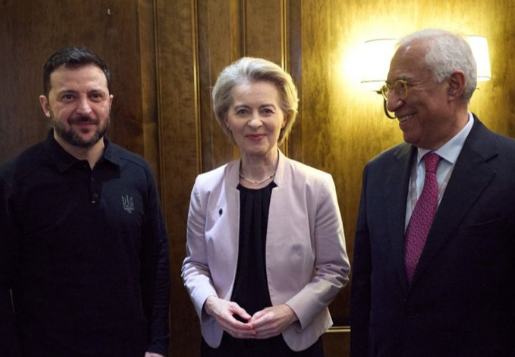
 Ukraine President Volodymir Zelenskyy, EU President Ursula von der Leyen and European Council President António Costa after a meeting in Munic, February 14, 2025. /URSLA
Ukraine President Volodymir Zelenskyy, EU President Ursula von der Leyen and European Council President António Costa after a meeting in Munic, February 14, 2025. /URSLAThe European Union has committed to back Ukraine until the country realises peace amid sustained invasion by her former Soviet ally Russia.
Russia invaded Ukraine on February 24, 2022, in a major escalation of the Russo-Ukrainian War, which had started in 2014.
The incursion, the largest and deadliest conflict in Europe since World War II, has caused hundreds of thousands of military casualties and tens of thousands of Ukrainian civilian casualties.
In a meeting with Ukraine President Volodymir Zelenskyy on Friday in Munich, the President of the European Commission Ursula von der Leyen and her European Council counterpart António Costa committed to a "continued and stable support to Ukraine until a just, comprehensive and lasting peace is reached".
A read-out dispatched to the media indicated that the leaders underlined that only such a peace would lead to a sovereign and prosperous Ukraine and guarantee Ukraine's and Europe's security.
"They expressed the willingness to put Ukraine in a position of strength ahead of any future negotiations and that Ukraine is provided with strong security guarantees," the dispatch said in part.
Three years since Russia’s full-scale invasion of Ukraine, Russia still occupies roughly 20 per cent of the country after gaining over 4,000 square kilometers of territory in 2024.
Russia continues to bombard Ukrainian cities, while Ukraine maintains drone attacks on Russian ships and military vehicles.
Fighting and air strikes have inflicted over 40,000 civilian casualties, while four million people are internally displaced, and 6.8 million have fled Ukraine.
Another 14.6 million people need humanitarian assistance.
Ursula and Costa stressed the need for Europeans to increase their defence spending and strengthen their defence capabilities and help reinforce the Ukrainian armed forces.
They on their part stressed their willingness to step up the work to accelerate the accession process of Ukraine to the European Union.
Elevation to EU membership would afford Ukraine a stronger voice on the international stage when acting as a united bloc and access to a large single market with free trade, increased economic opportunities, funding for regional development, consumer protection, and the promotion of democratic values and human rights within the bloc.
The European Commission and the European Council are all institutions of the European Union (EU) although they each have different roles and responsibilities.
The European Commission is EU's executive body and represents the EU's common interests, makes decisions collectively through the College of Commissioners and is accountable to the European Parliament for its decisions.
The European Council on the other hand is made up of the heads of state or government of EU member states as well as the President of the European Council and the President of the European Commission.
It's mandated with defining the EU's political direction and priorities.







![[PHOTOS] Guardian Angel bus catches fire in Kikuyu](/_next/image?url=https%3A%2F%2Fcdn.radioafrica.digital%2Fimage%2F2025%2F04%2F58287f0a-f201-4a78-87f0-6f147ad8ba8a.jpg&w=3840&q=100)



